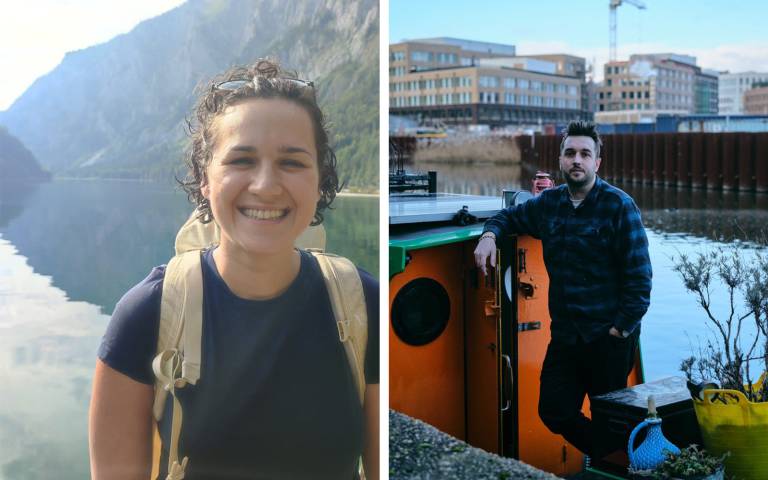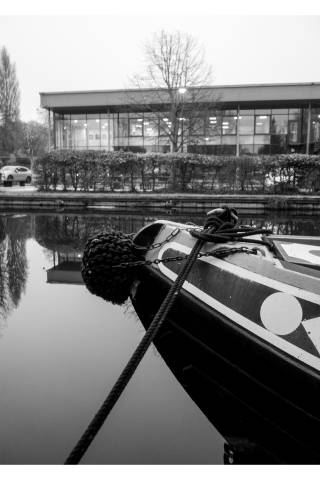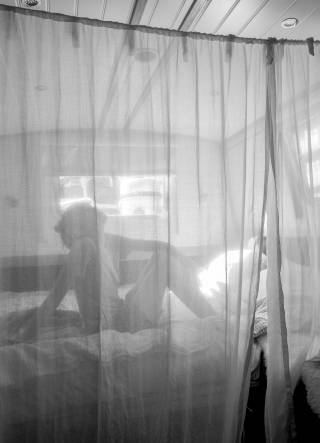A Q&A with Joseph Cook and Nura Ali – organisers of the ‘Navigating the System' exhibition
20 March 2023
‘Navigating the System: A Boater Healthcare Exhibition’ is a co-curated exhibition about London’s boater community and difficulties they face accessing healthcare, it opens in UCL Urban Room at UCL East on the 24th March 2023.

Audiences visiting the exhibition can expect to be taken on a journey through photographs by boater and photojournalist Caitlin Vinicombe and testimonial accounts documented in research by Joseph Cook (PhD, Anthropology, UCL) and Nura Ali (PhD, Bartlett Development Planning Unit, UCL). Displays include information about how the issue of having no fixed address impacts accessing everyday services and urgent healthcare. UCL School for the Creative and Cultural Industries talked to Joseph and Nura about the research and intention behind the exhibition.
Why were you interested in exploring this topic initially?
Joseph: I’ve lived as a continuous cruiser on a narrowboat for a while now, and during lockdown I kept getting into conversations with my boat neighbours who didn’t have a GP, or had been through a struggle to get one, and in general felt very disenfranchised from accessing basic healthcare services. I also tried to change GP myself and was wrongly rejected because I was unable to give proof of address. I was interested in learning more about the human stories behind these healthcare access challenges and am very grateful that UCL Grand Challenges and UCL East were able to fund our research.
Nura: I was drawn to the Boater Health project because I'm interested in how urban health inequalities come to exist, and which role the environments we live in play in that regard. In my PhD, I am doing research on socio-spatial health inequalities originating in water infrastructures in a neighbourhood built on stilted housing in Lagos, Nigeria. So, when Joseph reached out to me, I was curious to see how water-related environments play out in the operationalisation of Londoners' right to health.
The exhibition is based on yearlong research by the two of you. Tell us a bit more about how the research was conducted and what stood out to you from the responses.
Nura: We thought that having an initial survey would give us a lot of responses about the general issues with access to healthcare services due to registration problems. So, we sent out an online survey in specific boater groups on social media, via email and in-person through flyers with QR codes. We got an overwhelming response of 111 interviews (after data clearance) to that survey, with 58 people indicating interest in being interviewed personally to talk about their experiences. From these people we selected those whose cases stood out the most and did interviews with them. For me, photography is an excellent research method whenever we deal with sensitive topics. Access to healthcare can be difficult to talk about, so the photography part was a great way to dig deeper while being mindful of people’s experiences.
Joseph: I think what stood out to me was the massive variety in the challenges people are facing, and how what can seem a small thing on the surface, like not having a postcode, can create all sorts of difficult issues in reality. This is why we wanted to focus on people’s stories, because sometimes pure quantitative data doesn’t quite get the full point across.

Why did you decide to create an exhibition from your findings?
Joseph: From the beginning our aim was not to create a perfect solution – we were never going to revolutionise the NHS. We were interested in getting a conversation going, and exposing a hidden issue to the wider public. An exhibition like this one allows us to invite people in to read these amazing stories, and to connect UCL students with ongoing research on their doorstep.
Nura: The photographs we got were really great – Caitlin did an amazing job. We also got very powerful quotes and thought it’s a fantastic opportunity to disseminate the findings to a wider audience and create awareness on the topic. In the end, that’s what the project is about – and hopefully, this awareness will reach those who can do something about it.
Joseph, you’re a boater yourself, as is the photographer Caitlin Vinicombe and Lucie the illustrator. Why was it important to you that boaters were involved in all aspects of the exhibition?
Joseph: London’s boaters are, in some ways, a very over-researched community. There’s a never-ending series of magazine articles glamorising the lifestyle, and how person x or y escaped the housing crisis by moving aboard. It was important for us to develop a much more nuanced, community-involved project. Being a boater myself, and working with a number of boaters throughout the research and exhibition development was vital in gaining trust and getting the great insights which we did.
Nura: It does something to the findings when you have people who know what questions to ask, what is relevant and what might be a beaten track. The same is the case with artistic forms of expression – the perspective is more authentic and from an ethical point of view, it’s also crucial that the person behind the camera does not impose an outside gaze on the visual representation or illustration.

What would you like visitors to take away from the exhibition?
Nura: For me, it’s the awareness that it is small acts of exclusion that can have a big impact on people’s lives, in whichever context. It would be fantastic to get many health professionals to see the individual stories and adapt their registration policy, and on the other hand many boaters who will insist to be registered because they know it’s their right to have access to a GP regardless of their address.
Joseph: We were very keen on doing something different with the photography. It’s not just photos of people stood on their boat like you’d get in a magazine. By anonymising the photos, and not including any faces or boat names, somehow they are both more abstract and more real, it’s not cartoonish portraits. I think that’s what we want people to take away, that people that live on boats aren’t just a curiosity, but a diverse community navigating a range of challenges.
About the Urban Room
Located in Stratford at the UCL East Campus, UCL Urban Room is an experimental exhibition space for students, researchers, artists, and community members. Based on the idea of an ‘urban room’ as a forum for community driven debate and dialogue, the UCL Urban Room brings together academic research and lived experiences of city residents to inspire meaningful education for our students and visitors. Users of the Urban Room are invited to join a dynamic network of practice focused on issues of global urbanism, heritage, arts, and social history.
The space is equipped with oral history recording and archiving capabilities through its initiative of a Memory Workshop. Together, UCL Urban Room and Memory Workshop are supported by The Bartlett Faculty of Built Environment and the School for Creative and Cultural Industries at UCL.
Further information
'Navigating the System: A Boater Healthcare Exhibition' runs from 24th March - 29th April and is open to visit Monday - Saturday, 10am - 6pm. - you don't need a ticket to book. Email urbanroom@ucl.ac.uk for large groups or school visits. Find out more about the exhibition and associated events.
Follow the process and learn more about the project:
 Close
Close

